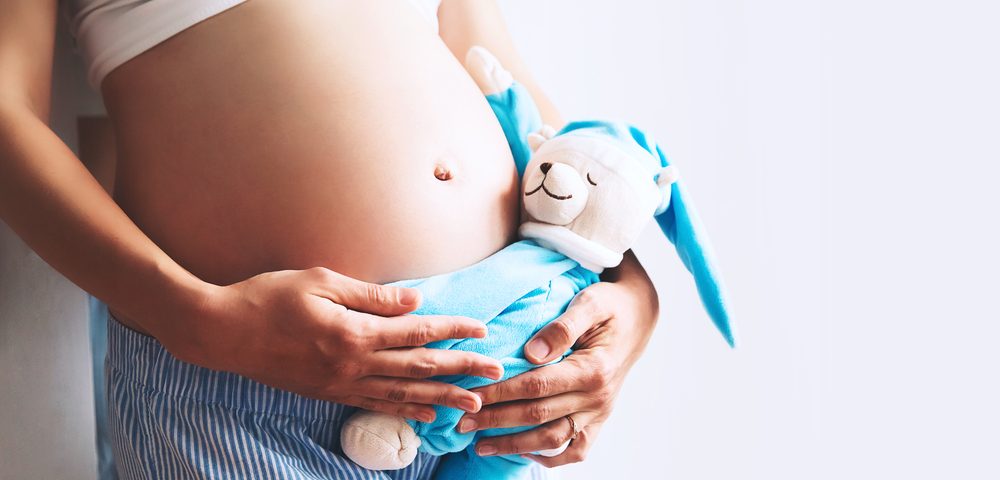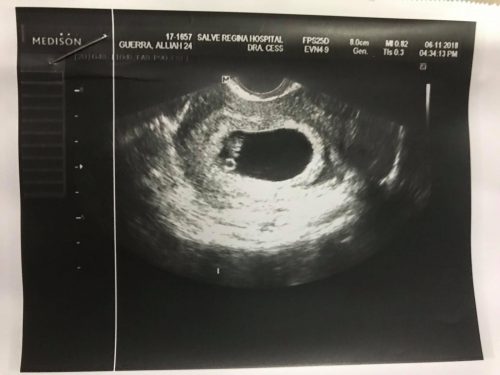Starting My Journey to Motherhood as a #HemoGirlfriend
Written by |

My partner Jared and I are confined to our bed. He got a small ankle bleed from tripping on an uneven sidewalk yesterday, whereas I woke up with a terrible case of nausea — just as I thought my morning sickness was starting to improve. Apparently, I have good days and bad days with my new pregnancy, the same way Jared does with his severe hemophilia B and epilepsy.
At 10 weeks, our baby in my womb is now the size of a grapefruit. I barely have a baby bump, so it still isn’t obvious to other people that I’m pregnant. In fact, over the past month, I’ve actually managed to lose 2 pounds. Jared was worried because pregnant women typically gain weight from the growing baby. However, my OB reassured me that losing a few pounds in the first trimester was normal, especially in cases of extreme morning sickness. In my case, I vomit as often as five times a day, not just in the mornings but also during the late afternoon. I also get diarrhea and stomach pain.
Due to my history of stomach issues stemming from my battle with an eating disorder during my college days, each experienced stomach discomfort brings back traumatic memories, making me feel doubly unwell. I vividly recall the times I couldn’t attend classes for several days due to painful diarrhea that left me weak, dehydrated, and incapacitated for weeks — the result of starving myself in the months prior. Or the time I drank three bottles of beer on an empty stomach — the result of a depressive episode — and ended up giving myself a horrendous bout of gastritis that lasted over two weeks (and has kept coming back since).
As much as I want to move around and start doing profitable work, my upset stomach and constant fatigue render me unable to do so. And when Jared also gets a bleed, it becomes difficult for either of us to accomplish what we ought to do. Now that I’m pregnant, it’s almost as if I have a disability, too, albeit temporarily. And yet I still have to be the more “normal” one.
Just this morning I was asked to pick up factor IX from the third floor of our house. I had awakened with stomach discomfort, and the trip up two flights of stairs was hellish. I ended up bringing back one vial with the wrong amount of factor because I couldn’t read the label properly, having left my glasses behind. I was so distracted by my nausea that I couldn’t even do one simple task properly. The moment I got back downstairs, I flopped down on the bed in defeat.
Hopefully, things will get better once I get to my second trimester. People say pregnancy is hard enough as it is. How much harder is it when your partner has a disability and you have a mental illness? How do you get through?
At this point, we have a lot of worries: How are we going to earn enough money for our baby’s needs? Especially now that neither of us can work full-time? Our nearly 10-year-old car broke down this week, and now we need a new one. How will we pay for it?
Thankfully, we continue to have his parents’ support. But their resources are finite, too. His older brother was diagnosed with cancer last year and is still undergoing treatment. We need to start becoming fully independent.
There are days when our fears overpower us. But most other days we remain hopeful. We strive to see this baby as a blessing. I had always wanted to experience motherhood at a young age so I could be with my son or daughter for a long time, and we could bond without the struggle of bridging a huge generation gap. Now that Jared and I are 25 and 24, respectively, it is neither too early nor too late. I remind myself of the plans we had before this happened and the things we intended to do while I’m pregnant, and then after the kid is born. One day at a time, I say.
As I finish writing this column, Jared puts his arms around me. “It’s bad today,” he muses sympathetically. He then asks me if I’ve vomited a lot. I nod sadly — yes. He hugs me tighter and gently rocks me from side to side. He rubs my back and tummy. I feel enveloped in love, for my baby and me. I think, “This guy will make a good daddy, and I’m thankful for him.”
***
Note: Hemophilia News Today is strictly a news and information website about the disease. It does not provide medical advice, diagnosis, or treatment. This content is not intended to be a substitute for professional medical advice, diagnosis, or treatment. Always seek the advice of your physician or another qualified health provider with any questions you may have regarding a medical condition. Never disregard professional medical advice or delay in seeking it because of something you have read on this website. The opinions expressed in this column are not those of Hemophilia News Today or its parent company, Bionews Services, and are intended to spark discussion about issues pertaining to hemophilia.




Leave a comment
Fill in the required fields to post. Your email address will not be published.